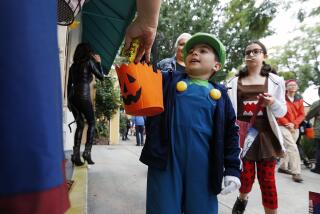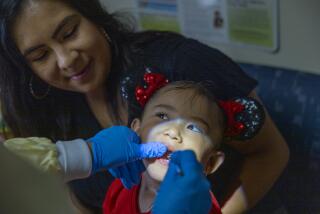FOR THE KIDS SWEETS : Candy Is Dandy : Dentist’s say traditional Halloween treats aren’t as bad for teeth as once thought.
- Share via
You’ve preached the evils of sugar. You’ve banished chocolate from the house. You’ve pushed the so-called healthy stuff, like raisins and those fruit roll-up things.
And now it’s Halloween. You’re about to blow a gasket as the kids bring home bags of candy and proudly dump it on the floor.
Now comes word from the American Academy of Pediatric Dentistry.
CHILL OUT!
Chocolate actually inhibits tooth decay. And sugar, well, it’s not so bad.
The academy has changed its tune. Just a generation ago dentists looked at food as either good or bad for the teeth. Candy was definitely on the bad list.
Not now.
“Everything we thought of as gospel, isn’t any more,” said Mark Lisagor, a pediatric dentist with offices in Camarillo and Oxnard. “There’s a whole lot of food out there that is just as harmful as candy.” The message, now, he said, is moderation.
The academy has a much softer approach to sugar and a harder approach to some foods previously thought of as healthy.
Dentists are looking at all kinds of food in a whole different light.
“We’re not out there telling people not to eat candy,” said John Bogert, executive director of the Chicago-based academy. The attitude change has been a gradual one over the last decade, and it has blown some long-held myths out of the water.
For instance:
* The chemistry in chocolate is actually beneficial for decay prevention. “We don’t really know why,” Bogert said. When mouth saliva interacts with chocolate it reduces cavity-causing acid. Aged cheese, like Cheddar, does the same thing.
* Sticky sweets, like caramels, are better for teeth than so-called healthy snacks like raisins and fruit roll-ups because they clear the mouth more quickly. Raisins and fruit-roll-ups cling to the teeth longer, providing a better environment for decay. Lollipops are just as bad. “The youngster who goes around with something in his mouth all the time is going to have problems,” he said.
* Even cooked starches like bread, crackers and corn flakes are no longer touted as safe for teeth. They contain sugar and stick on the teeth more than other foods. “A soda cracker takes hours to break down,” Bogert said.
* Less sugar isn’t necessarily better for teeth. It takes only a low concentration of sugar to stimulate cavity-causing bacteria.
* Even fruits and vegetables aren’t cavity-proof. It’s the frequency of snacking--more than the type of food--that causes cavities. The academy recommends no more than three or four between-meal snacks.
* Chewing gum, sugared or sugarless, helps teeth. It stimulate saliva which helps flush bacteria from the teeth.
* Even compulsive brushing isn’t necessary. Twice a day, after breakfast and before bedtime, will do the job.
As for Halloween candy, “a sporadic binge isn’t going to hurt anyone,” Bogert said. Others take the same casual approach.
“Let them overdo it for a few days, then dump what’s left,” Lisagor said. Like other dentists, he recommends that parents offer candy once a day, preferably as dessert.
“I’d rather see them have it all at once after dinner,” said Lynn Wan, a pediatric dentist in Ventura. “As long as it’s only a few candies and not two grocery bags full.” Eating five pieces at one sitting rather than throughout the day is preferable, she said, because there is less opportunity for the decay process to begin. The issue these days is how long the sugar stays on the teeth.
For Halloween handouts, she prefers fruit, popcorn or peanut-butter treats, instead of candy, especially sticky candy.
But, she added, “I don’t believe in depriving kids.”
More to Read
Eat your way across L.A.
Get our weekly Tasting Notes newsletter for reviews, news and more.
You may occasionally receive promotional content from the Los Angeles Times.










